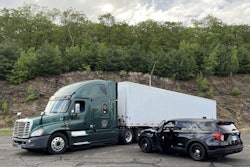 The cover slide from Oklahoma Department of Public Safety's recent press conference about its immigration enforcement actions on I-40.Oklahoma DPS
The cover slide from Oklahoma Department of Public Safety's recent press conference about its immigration enforcement actions on I-40.Oklahoma DPS
Oklahoma's recent "special emphasis" law enforcement action at a Port of Entry on I-40 resulted in 120 arrests, 90 of those taken into custody being commercial drivers, with lots of equipment impounded and suspicious CDLs to investigate.
The move also shows Immigration and Customs Enforcement's work with state police to bring the Trump administration's wider deportation ramp-up to trucking.
At a press conference on Tuesday, Sept. 3, Oklahoma Department of Public Safety Commissioner Tim Tipton said Oklahoma has been preparing to work with the feds on immigration enforcement since November 2024, just after the presidential election. Typically state law enforcement does not enforce federal immigration policy. Some states may turn over unauthorized immigrants to ICE, but many "sanctuary" states and cities do not work with ICE.
 Tim Tipton
Tim Tipton

Oklahoma troopers statewide can now police immigration violations during normal daily patrolling activity, said Tipton.
Oklahoma's police action on I-40 took place between September 22 and 25, and in the period of just more than two working days, "approximately 520 contacts were made by OHP troopers and 120 illegal aliens were detained for immigration violations," said Tipton. The Oklahoma Port of Entry on I-40 requires all trucks to stop, and Tipton expressed some surprise at just how many of the trucks encountered were driven by illegal aliens.
"Nearly 25% of the people we came into contact with were not here legally," he said. Of the 120 detained, 90 were CMV drivers, he said, with the other 30 being passenger traffic pulled over on "probable cause" stops. Among CDL drivers taken into custody were 44 with credentials issued by California, 14 by New York, 12 by Pennsylvania and 11 by Illinois, Tipton added.
Of those 120, according to Tipton, all had crossed into the U.S. via the southern border, and "the vast majority" crossed between 2020 and 2024.
The exact reasons for the 120 arrests?
"There were some that illegally reentered after being deported already," said Tipton. "Several of them had final deportation orders in place that they had not responded to and were still at large. Quite a few who had entered without ever being inspected" and making an "undetected crossing of the southern border at some point and weren’t even on the radar of ICE" previously.
Some had overstayed visas so far that they "were in that overstay status which calls for immediate deportation as well," Tipton added.
In addition to lack of legal status in the country, many had criminal histories, too, said Tipton. "Some of the types of prior charges" included "human smuggling, drug trafficking, money laundering, assault, DUI and failure to appear for past criminal charges."
Tipton then gave a bit of explanation on how exactly those detained were getting CDLs.
"Until recently, federal law allowed for states to issue what they called 'non-domiciled CDLs' to illegal aliens if they had an employee authorization document, or an EAD," he said, referencing DOT's action in September to pause non-domiciled CDL issuance and bring it back with much stricter rules. "EADs are commonly issued to aliens who enter the country illegally while seeking asylum. So they’ll get one of these cards that appears to give them a work status," but "EAD does not grant immigration status."
Tipton pointed to the CDL issuance errors uncovered by DOT, including that California improperly issued one in four non-domiciled CDLs, and that Washington issued an asylum seeker a full term CDL rather than a non-domiciled CDL.
[Related: Washington admits mistake in issuing Harjinder Singh and 685 other non-citizens full-term CDLs]
"Just in the last week an FMCSA study found that some states were handing out CDLs indiscriminately to illegal aliens," said Tipton.
Oklahoma itself also accepted EADs and issued non-domiciled CDLs to non-citizens, with the state telling Overdrive that as of May it had 253 such active credentials. That same month, the state passed a law putting more scrutiny on non-domiciled CDL drivers and imposing a $3,000 fine for drivers that can't speak English.
Tipton pointed to FMCSA finding California had issued CDLs to non-citizens that sometimes remained valid as long as nine years after the expiration of the person's legal length of stay in the country, which he called "definitely a serious threat to public safety."
One CDL that belonged to an "illegal alien" highlighted by Tipton came from New York State and was a Real ID. The driver's first name reads "no name given."
New York's DMV said the no-name CDL "was issued in accordance with all proper procedures, including verification of the individual’s identity through federally issued documentation," adding that the "individual has lawful status in the United States through a federal employment authorization." The DMV noted the license was issued in line with federal rules.
As for the no name aspect, New York gave a similar response to what California told Overdrive in June.
"It is not uncommon for individuals from other countries to have only one name," a New York DMV rep said. "Procedures for that are clearly spelled out in the U.S. Citizenship and Immigration Services policy manual, and it is important to note that federal documents also include a ‘no name given’ notation."
Nonetheless, Tipton said it was "very problematic not knowing who it is driving these large trucks," and pledged his troopers would continue to enforce immigration rules.
"DPS and OHP aggressively started enforcing this in the past year" and "moving forward we’ll continue with these types of operations." Tipton and Oklahoma DPS "felt it’s imperative we take that enforcement serious and be proactive about it."
As far as the trucks go, Tipton said OHP "called a local wrecker in the area and took it to a storage yard." Now, fleets with drivers arrested for immigration violations will pay impound fees to get equipment and freight back.
[Related: FTC's 'junk fees' rule could protect trucking from predatory towing]
The companies weren't a priority for OHP, though Tipton did find cause for concern. "We saw bills of lading that were photocopied bills of lading, which is not normal," he said. "So to even know where that truck was going or coming from is difficult to figure out."
It remains to be seen if other states will follow Oklahoma's lead, but Tipton said Oklahoma would stay on the case.
"Absolutely it will be sustained model," he said of the raids. "It’s one of our primary duties as the highway patrol to ensure the safety of our motoring public. You can put your hands on this threat, so we’re going to do everything we can."
Oklahoma isn't alone in partnering with ICE. An October 1 press release from the Laramie County, Wyoming, Sheriff's Office said the county sheriff and 25 deputies there were "sworn in by ICE and authorized to enforce immigration law" under the program. "Each deputy completed training in cultural diversity, profiling, naturalization process, document identification, visas, and constitutional standards." Officers there stated a goal of enforcement against human traffickers along I-25 and I-80 in the county.
[Related: Oklahoma bill: $3,000 fines for drivers who can't speak English, prove identity]
At the federal level, the Trump administration continued to turn up the heat on non-citizens seeking work status in the country with two new moves.
- The I-94 form, which declares someone's legal presence in the country, just had its fee hiked from $6 to $30. Overdrive reporting around non-domiciled CDL issuance found most states require the I-94 and an EAD to get a non-domiciled CDL.
- U.S. Customs and Border Patrol in September introduced the "Inadmissible Alien Apprehension Fee" -- a $5,000 fee for any "alien 14 years of age or older who illegally entered the United States without being inspected or admitted and is determined to be inadmissible."










